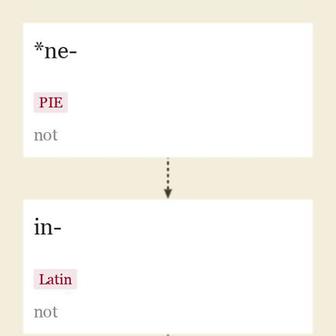Entries linking to imprevisible
mid-14c., from Old French visable, visible "perceptible" (12c.) and directly from Latin visibilis "that may be seen," from visus, past participle of videre "to see" (see vision). An Old English word for this was eagsyne. Related: Visibly.
word-forming element meaning "not, opposite of, without" (also im-, il-, ir- by assimilation of -n- with following consonant, a tendency which began in later Latin), from Latin in- "not," cognate with Greek an-, Old English un-, all from PIE root *ne- "not."
In Old French and Middle English often en-, but most of these forms have not survived in Modern English, and the few that do (enemy, for instance) no longer are felt as negative. The rule of thumb in English has been to use in- with obviously Latin elements, un- with native or nativized ones.
word-forming element meaning "before," from Old French pre- and Medieval Latin pre-, both from Latin prae (adverb and preposition) "before in time or place," from PIE *peri- (source also of Oscan prai, Umbrian pre, Sanskrit pare "thereupon," Greek parai "at," Gaulish are- "at, before," Lithuanian prie "at," Old Church Slavonic pri "at," Gothic faura, Old English fore "before"), extended form of root *per- (1) "forward," hence "beyond, in front of, before."
The Latin word was active in forming verbs. Also see prae-. Sometimes in Middle English muddled with words in pro- or per-.
Trends of imprevisible
More to Explore
updated on September 28, 2017
Trending words
Dictionary entries near imprevisible
impressionism
impressionist
impressionistic
impressive
impressment
imprevisible
imprimatur
imprint
imprison
imprisonment
improbability

